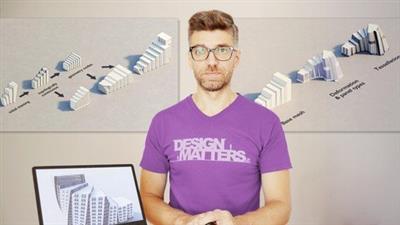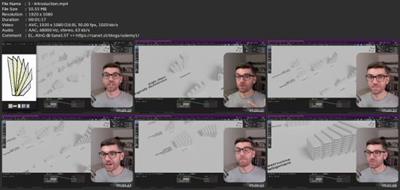Parametric Staggered Building Forms With Blender
Published 3/2024
MP4 | Video: h264, 1920x1080 | Audio: AAC, 44.1 KHz
Language: English | Size: 3.53 GB | Duration: 3h 5m
Architectural massing strategies to iterate procedurally and create architectural concepts
What you'll learn
Learn how to use Blender for parametric Design
Generate parametric building massings that can easily be adjusted
Procedural modifiers-based design workflows
Procedural Geometry Nodes design workflows
Requirements
Basic Blender knowledge is preferred but not essential
Description
In this course, you will learn specific strategies for generating numerous architectural massings with ease.You will achieve this new knowledge by creating massings and concepts for a staggered building, mimicking the typical design ideation process that most professionals and students utilise for early stages of projects.The goal of this course is to equip you with a series of workflow strategies that enable you to ideate and bring more of your ideas out more quickly and effectively.Part 1 - MassingsYou will learn how to create quick massings both non-destructively and destructively in edit-mode. You will learn multiple procedural workflows that allow instant adjustments of massings without having to manually redo work. These workflows will empower you to quickly and easily adopt and modify massings, replicating the typical contextual, programmatic, team, or client-based adjustments that drive the design evolution.The procedural workflows encompass techniques utilising multiple modifiers, including Geometry Nodes. The edit-mode workflows teach you how to modify your geometry based on topological adjustments like understanding where it insert loop cuts, splits, connecting vertices, and others.Throughout the course, most of the emphasis is placed towards procedural workflows. Yet, it is equally as important to have prime knowledge of modifying topology of any given massing that is sometimes essential for further development.Part 2 - Architectural conceptsAfter you learn the techniques for creating quick architectural massings, we will investigate turning some of the massings into a more developed architectural concepts, portraying a sense of scale and proportion. Will still part in early ideation phase, these architectural concepts will provide snapshots to understand and communicate whether the project is evolving in the desired direction, without needing to resolving all the project parameters. In this phase, we first will look at modifying a massing to create topological continuity. This is both easier in some respects and more difficult. It is easier because sometimes to process of modifying geometry directly is more straightforward. Yet, in the initial highly iterative design process, where numerous massings need to be generated quickly, manually adjusting the topology for multiple options becomes a time consuming and repetitive process.Thus, second, we will investigate procedural techniques of generating architectural concepts from the earlier sets of massings. The intent is to provide you with highly creative workflows by reducing the manual process of editing the massings to a minimum. In this step-by-step process, the techniques become more advanced where, eventually you will learn how to further streamline the process with Geometry Nodes into an almost completely automated massing and architectural concept generation process.Throughout the course, we will be utilising the Tissue addon to tessellate panel components onto the massings. This step is a further optimisation process that helps reduce the time you need to spend on creating options so you can get to the right one quickly and efficiently.Part 3 - PresentationPresenting work is as important as generating the work. Hence, why we believe it is as essential to provide knowledge for you that teaches you how to present concepts effectively. This includes creating hidden-line type renderings, isometric cameras, and laying your models in a manners that showcases your design process thinking to the stakeholders (clients, managers, professors).What you getTo help you learn more optimally and progressively, the course includes assignments that allow you to practice with your own ideas beyond the material presented. The best work that is submitted will be showcased throughout this course and on social media with credits. Furthermore, you will gain access to an exclusive community of other students like you where you can ask questions and showcase your work. Additionally, you can comment directly on each lesson and you will have access to email supportThe course includes automatically generated subtitles which can be searched in the video player. This his highly useful when you like to go back and find a reference for something you remember watching initially.This course also includes live sessions where you can ask your questions directly to the instructor. The live sessions will be recorded and uploaded to the course curriculum so even if you missed a live session, you would be able to recap and learn from other students' questions.By the end of this course you will :Reduce the time you spend on creating massings in the earliest ideation phases of design List item twoEnable more creative output of your ideas by learning how to work more effectively with Blender's inherent procedural workflows List item fourProduce your designs more efficiently with Geometry Nodes and the Tissue addon.Compellingly record and present your design processes.
Overview
Section 1: Part 1: Building Blocks
Lecture 1 Introduction
Lecture 2 1st option - simplest possible
Lecture 3 2nd option - topologically correct
Lecture 4 3rd option - array modifier
Lecture 5 4th option - Geometry Nodes
Lecture 6 4b - Geometry nodes 2 - more parametric
Lecture 7 Per instance geometry nodes parameters
Section 2: Part 2a - Develop initial concept based on topologically correct massing
Lecture 8 Develop a concept
Lecture 9 Improve component
Lecture 10 Recap and challenges with initial topologiclaly correct mass
Section 3: Part 2b: Developing concepts from non topologically-correct massings
Lecture 11 Create a concept from geometry nodes massing
Lecture 12 2nd concept from same geometry nodes massing
Lecture 13 Create a topologically correct object from geometry nodes massing
Lecture 14 Tessellating the concept with Tissue
Lecture 15 Few thoughts on floor plans
Lecture 16 Continue developing previous concept with deform modifiers
Section 4: Part 2c: Working more with Geometry Nodes for developing a concept
Lecture 17 Automating the concept development with Geomety nodes
Lecture 18 Adding an attractor
Lecture 19 Tessellating with Tissue
Section 5: Part 3 - Presenting your work
Lecture 20 Set up Render settings, lights, and materials
Lecture 21 Set up first camera view and composition
Lecture 22 Add wireframe overlaps with Geometry Nodes
Lecture 23 Set up third and fourth views
Lecture 24 Grease pencil line modifier
Lecture 25 Create a view of all the massings together
Lecture 26 Images review and parallels to actual office projects
Lecture 27 Create perspective views, elevations, top view
Lecture 28 Closing remarks
Architects and Designers,3d Artists,Architecture and Design students,Parametric designers,Procedural artists and enthusiasts
Screenshots
rapidgator.net:
nitroflare.com:Kod:https://rapidgator.net/file/c55470c1e5bdcbbc35097a7380406f87/xnrgc.Parametric.Staggered.Building.Forms.With.Blender.part1.rar.html https://rapidgator.net/file/912eae8376acab0688af20ccdd0e4831/xnrgc.Parametric.Staggered.Building.Forms.With.Blender.part2.rar.html https://rapidgator.net/file/cb5e3f9f96f8b1665896b85deb910c49/xnrgc.Parametric.Staggered.Building.Forms.With.Blender.part3.rar.html https://rapidgator.net/file/daf12506d5eaef6e2df932fe4c9351c0/xnrgc.Parametric.Staggered.Building.Forms.With.Blender.part4.rar.html
Kod:https://nitroflare.com/view/89F8E2D7FB268A8/xnrgc.Parametric.Staggered.Building.Forms.With.Blender.part1.rar https://nitroflare.com/view/F8D724DE4FCBE25/xnrgc.Parametric.Staggered.Building.Forms.With.Blender.part2.rar https://nitroflare.com/view/F7E99216842FBDD/xnrgc.Parametric.Staggered.Building.Forms.With.Blender.part3.rar https://nitroflare.com/view/251A79714C557C1/xnrgc.Parametric.Staggered.Building.Forms.With.Blender.part4.rar
1 sonuçtan 1 ile 1 arası
-
29.03.2024 #1Üye



- Üyelik tarihi
- 20.08.2016
- Mesajlar
- 144.947
- Konular
- 0
- Bölümü
- Bilgisayar
- Cinsiyet
- Kadın
- Tecrübe Puanı
- 153
Parametric Staggered Building Forms With Blender
Konu Bilgileri
Users Browsing this Thread
Şu an 1 kullanıcı var. (0 üye ve 1 konuk)



 LinkBack URL
LinkBack URL About LinkBacks
About LinkBacks






 Alıntı
Alıntı
Konuyu Favori Sayfanıza Ekleyin